Organising your restaurant waste collection is vital for all aspects of your business. The restaurant industry generates a huge amount of waste, particularly food waste. The concern for restaurant owners is that food waste can be incredibly expensive.
Not only is it investment from your restaurant that is quite literally going in the bin, but putting heavy food waste in your general waste bin is now illegal and is expensive, often resulting in charges for excess weight, financial penalties or disruption to your service.
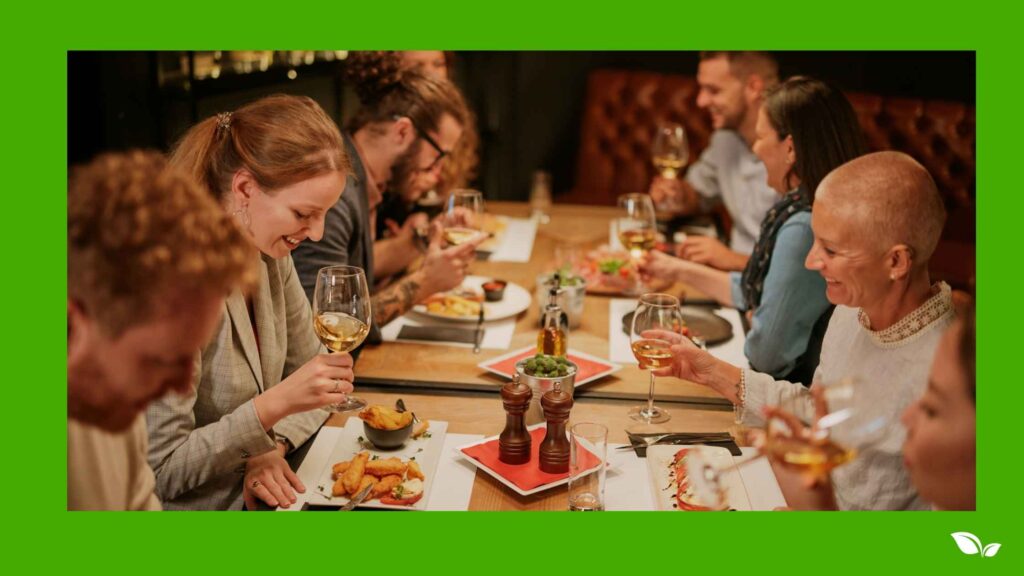
1.What Waste is Generated in the Food Industry?
It’s no surprise to any restauranteur, takeaway operator or cafe owner, that the food industry generates a lot of waste.
Did you know that in the UK, it is estimated that the UK throws away around 9.5 million tonnes of food waste every year (The Eco Experts 2024). If you laid out all of that food waste end to end – it would circle the Earth more than 6 times!
Food establishments are responsible for a significant portion of food waste worldwide.
What Types of Waste do Restaurants Produce?
Restaurants, takeaways, and cafes produce mostly general waste, food waste, recyclable waste and glass waste.
However, food establishments that provide food products that have a smaller niche or may be larger in size may generate other types of waste that need managing.
Here are some examples of the types of waste that restaurants can generate:
Food Waste
- By-Products (such as the food waste that is made by preparing food. This includes fruit & vegetable peels, or coffee grounds).
- Expired or Spoiled Food Items (this includes any food that has passed its expiry date or has ‘gone off’)
- Leftovers (also known as plate waste and table scraps. Any remaining food that was part of a meal that wasn’t eaten.
- Unsold Inventory (can come from overproduction when a restaurant prepares too many food items).
- Spilled or Ruined Food (any food that may have been spilled on the table or on the floor, or ruined by being overcooked or burned).
General Waste
- Non-Recyclable Packaging: (such as plastic food containers, foam packaging, and non-recyclable paper products).
- Paper Waste: (e.g. disposable menus, napkins, paper towels, and any non-recyclable paper items used in food preparation).
- Plastic Waste: (this could include plastic cutlery, straws, condiment packets, and other single-use plastic items).
- Non-Recyclable Glass: (large pieces of sharp or broken glass that cannot go into glass recycling, or non-recyclable glass like pyrex or mirrored glass).
- Cleaning Supplies: Empty cleaning product containers and disposable cleaning materials.
Dry Mixed Recycling
- Cardboard: (such as cardboard boxes used for food deliveries, packaging materials, and cardboard food containers).
- Paper: (office paper, cardboard packaging with no food residues, and paper bags).
- Plastic Bottles: (e.g. empty plastic bottles for beverages or condiments, used water bottles and soda bottles).
- Cans: (like soft drink cans, food cans, aerosol cans for whipped cream or cooking spray etc).
- Clean Food Cartons: (e.g. as milk cartons and juice boxes).
- Clean Plastic Containers: (plastic containers with recycling symbols, including yoghurt cups, and plastic containers).
- Clean Foil: (tin foil that is clean).
- Clean Plastic Bags: (such as plastic bags without food residue, such as shopping bags or plastic film).
- Empty Glass Containers: Empty glass containers used for sauces, dressings, or condiments.
Glass Waste
- Glass Bottles: (empty wine bottles, beer bottles, and soft drink bottles).
- Glass Jars: (e.g. empty glass jars used for condiments, sauces, jams, and pickles).
- Glass Containers: (such as containers used for food storage).
- Glass Tumblers: (water glasses, wine glasses, champagne flutes)
- Glass Tableware: (e.g. glass plates, bowls, or serving dishes).
- Glass Condiment Bottles: (empty and clean glass bottles that held condiments like ketchup, mustard, or salad dressing).
Cardboard & Paper Waste
If your restaurant produces a large volume of cardboard or paper waste, it can be more cost effective to separate the waste and dispose of this in a separate recycling bin. Cardboard is highly recyclable, but only if it’s kept dry, clean, and uncontaminated by food residue.
- Outer boxes from food and drink deliveries
- Packaging from kitchen supplies and cleaning products
- Unused promotional materials or menus
Sanitary Waste
- Feminine hygiene products
- Nappies and incontinence products
- Tissues, wipes, and other personal hygiene disposables
These are most often found in staff and customer toilets, or baby-changing areas.
Confidential Waste
From staff payroll details to customer booking forms, some information needs to be destroyed securely.
- Staff employment records and HR documents
- Reservation forms containing personal contact information
- Supplier invoices, payment records, and receipts
Partnering with a secure shredding or confidential waste service ensures documents are destroyed before recycling, protecting your business from data breaches and maintaining GDPR compliance.
Waste & Pest Prevention
Good waste management in restaurants isn’t just about getting rid of rubbish; it’s also about keeping pests at bay.
Pest issues often arise from:
- Food scraps left uncovered or in open bins
- Spoiled ingredients sitting too long in storage or bin areas
- Overflowing waste containers or bins that aren’t cleaned regularly
Common signs and sources include:
- Food waste discarded in open containers
- Spillage or residue around bin areas
- Dirty bins attracting flies, rodents, or cockroaches
Prevent problems by sealing all bins tightly, cleaning waste areas daily, and partnering with pest control professionals for ongoing preventative measures.
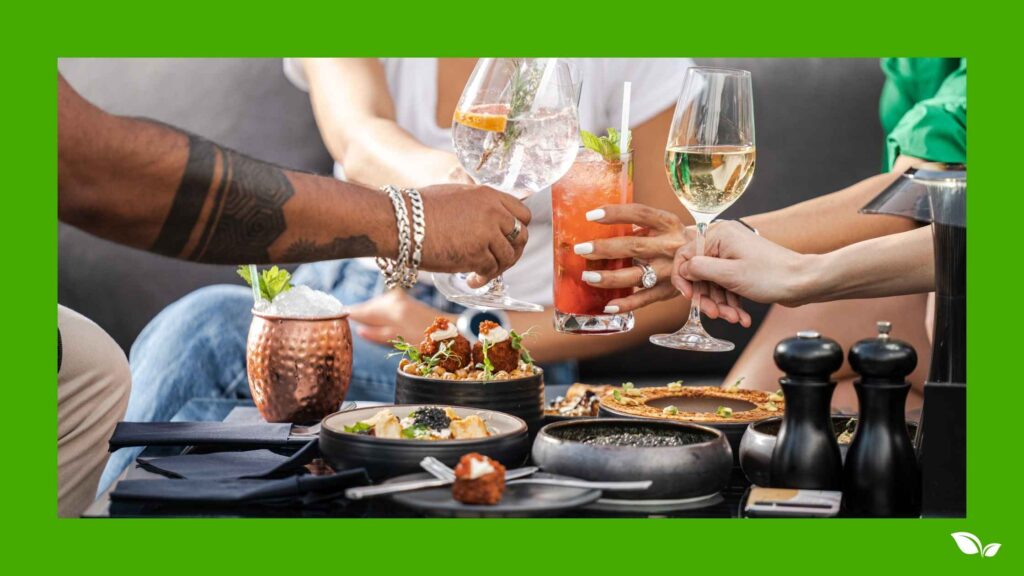
2.Why Is Restaurant Waste Collection Important?
Organising your restaurant waste collection is important because it can save your business huge amounts of money, address significant environmental concerns, and ensure your restaurant is compliant with government legislation.
Restaurants, bars, and cafes generate a substantial amount of waste, including food scraps, general waste, and recyclable materials.
When not collected and managed properly, this waste can end up costing your restaurant far more than it needs to and ultimately eats away at your bottom line.
Not only does it cost your restaurant more, but it costs the planet too.
Waste that is not recycled or managed properly is more likely to end up in landfills, contributing to methane emissions and environmental degradation.
There is also a legal obligation to dispose of your commercial waste responsibly.
This means your restaurant has a legal responsibility to do everything it can to not only keep waste to a minimum, but also do everything it reasonably can to reuse, recycle, and recover waste.
Legislation in place in England, Scotland and Wales now makes separating waste into specific waste stream mandatory, find out more about waste laws in this guide.
Saving Your Restaurant Money
Organising your restaurant’s waste properly with an adequate number of separate bins is a fantastic strategic move that can lead to significant cost savings for your business.
Waste collection is based not only on the type of the waste your collecting, the frequency, and the size of the bin your restaurant has, but actually a large amount of the cost comes from excess waste costs.
By segregating your waste into distinct waste types, it can reduce the weight in your general waste bin or dry mixed recycling bin and help your restaurant avoid the expensive excess weight fees made mandatory by UK regulations.
Even though it may seem more expensive to be ordering more waste bins for your restaurant, many of our customers have found this to be a huge cost-saving tool, particularly in comparison to some of the more expensive waste brokers on the market.
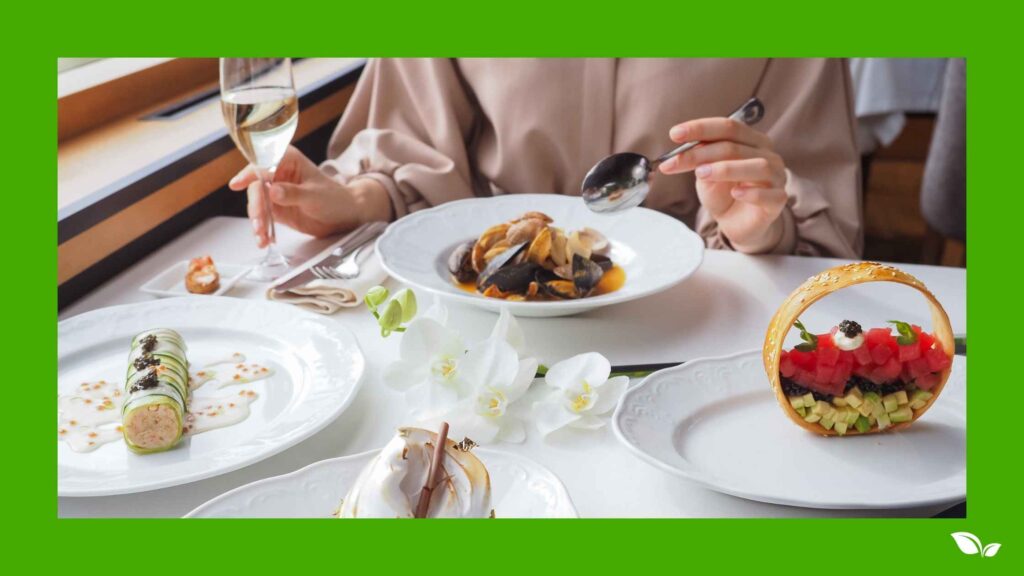
3.Environmental Impact
Our society today is incredibly environmental conscious.
Did you know that according to a Nielsen survey, 81% of global consumers feel strongly that companies should help improve the environment? (NielsenIQ 2018). In addition, Consumers are increasingly willing to pay more for environmentally friendly products, with studies indicating a willingness to pay an average of 9.7% more for sustainably produced or sourced goods (PWC 2024).
Businesses, especially those in the food industry, play a crucial role in mitigating the environmental impact of their waste.
Having separate waste streams has been proven to reduce waste, reduce costs and significantly benefit the environment.
Here’s why:
Diverting Waste from Landfills
One of the most compelling reasons to have separate waste streams in restaurants is to divert waste from landfills.
Landfills are terrible for the environment, contributing to harmful methane emissions, a potent greenhouse gas.
The UK throws away around 9.5 million tonnes of food waste every year (The Eco Experts 2024).
By segregating waste into categories such as general waste, food waste, glass waste and recyclables, restaurants are not only more likely to recycle the waste through the correct waste stream, but the waste itself is much more likely to be recycled or disposed of in an environmentally way.
Decreasing Methane Emissions
The largest amount of waste that restaurants produce is food waste.
If food waste is disposed of correctly, it can be turned into compost, biofuel or another product to embody circular economy principles.
When food waste is disposed of in a landfill, it will decompose anaerobically, producing lots of methane gas.
Did you know that methane is over 25 times more effective at trapping heat in the atmosphere than carbon dioxide over a 100-year period? (WMO cited The Cable 2023)
By separating your restaurant’s food waste and disposing of it through a food waste bin, it will be sent to specific facilities that have the most environmentally friendly ways of disposing of food waste, helping your restaurant massively reduce its carbon footprint.
Promoting Recycling
If your restaurant opts to get separate waste streams by ordering different bins, this is proven to encourage recycling, which conserves valuable resources and energy.
Did you know that recycling one tonne of cardboard saves over 17 trees and reduces greenhouse gas emissions by 1 whole tonne? (Collect and Recycle 2021).
By having dedicated bins for recyclables like cardboard, glass, and plastics, restaurants contribute to resource conservation and reduced energy consumption.
Legislation
Understanding and complying with waste management regulations is incredibly important to ensure your business stays legal and avoids fines and penalties.
The ‘Environmental Act’ which became law in 2021, establishes legally-binding environmental improvement targets for businesses. The legislation applies to all businesses across the UK, including restaurants.
In addition, waste separation legislation that has came into effect over the last few years mandates varying rules for recycling across different regions of the UK. This further enforces restaurants to separate and dispose of waste responsibly.
This means having dedicated bins for specific waste types, such as food, glass, recycling and general waste.
Non-compliance with these regulations can result in significant penalties for your business.
In addition, other legislation such as GDPR are vitally important for the data protection of employees and customers. Therefore, securely disposing of confidential paperwork and showing evidence of this when it comes to audits or inspections is vitally important.
While managing waste in the hospitality sector might initially seem complex, our team at Waste Basics is here to simplify the process for you.
We offer personalised guidance and support, helping you create an efficient waste management plan tailored to your hospitality establishment’s unique needs.
What are some Restaurant Waste Statistics?
With restaurant waste collection, understanding the alarming statistics surrounding food waste is paramount for both businesses and the environment.
Did you know that in the UK, 9.5 million tonnes of food waste are being wasted annually? (The Eco Experts 2024).
Did you know that the demand for food is going to increase dramatically by 2025. Current trends indicate that, meat consumption alone may increase by over 70% (FoodDrinkTalk 2025).
According to the FAO (Food and Agriculture Organization of the United Nations), global food production will need to increase by over 60% by 2050 to keep pace with the anticipated population growth and changing dietary demands (FoodDrinkTalk 2025).
It is projected that the world’s population will reach 9.7 billion by 2050 (The Population Project 2025).
The consumable food we waste costs the UK about £19 billion, with bread and potatoes being the most wasted foods in the UK. Food retailers spend around £51,000pa on sending food to landfill (The Eco Experts 2024).
Restaurants, cafes, bars, takeaways and other businesses in the food and hospitality sector generate a huge amount of waste that has a severe impact on not only the environment in the UK, but the entire world.
At Waste Basics, we have a thorough annual review of all of our waste collection partners to ensure that they are doing everything possible to reduce their environmental impact.
If any of our current partners do not meet the standards put in place by us, we stop using them completely and safely transfer our customers to another supplier.
If you care about your restaurant’s impact on the environment and want to partner with a Waste Broker that genuinely cares about sustainable waste management, then look no further than us.
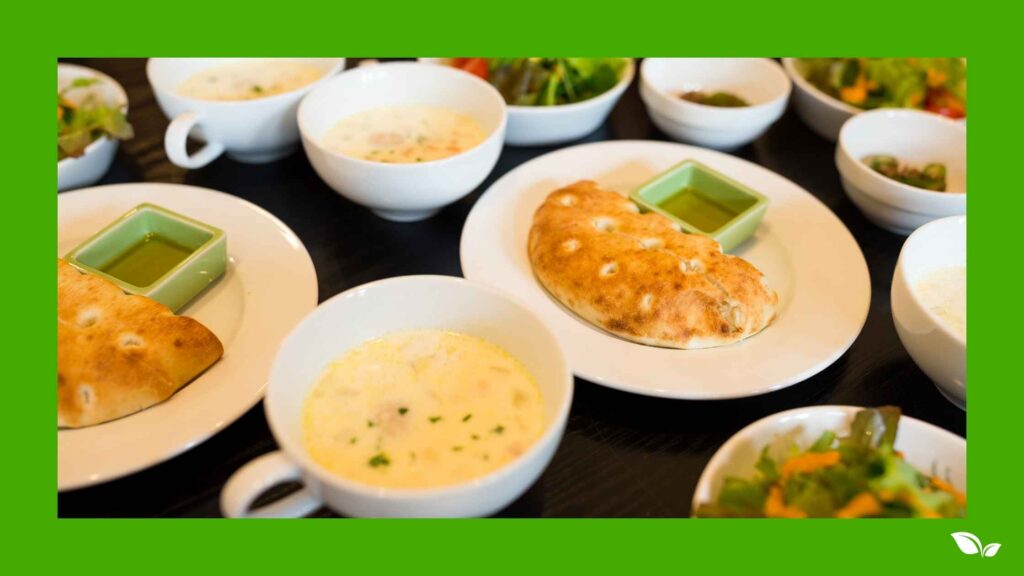
4. What Size Bins Do I Need for My Restaurant?
The bin sizes your restaurant will need will change depending on the size of your restaurant, what types of waste you produce and how much waste your restaurant produces.
Most restaurants produce general waste, food waste, dry mixed recyclable waste (including paper and plastic) and glass waste.
At Waste Basics, we offer four different sizes to suit your commercial general waste production, but some customers choose to double up or get multiple sizes, dependent on their waste requirements and storage space available.
General Waste
1100L Commercial General Waste Bin:
The 1100L general waste bin is by far, our most popular commercial waste bin, with over 90% of our customers having one!
It can hold up to 70kg before collection which equates to approximately 18 bin bags.
The size of the 1100L wheelie bin is 1.40m tall, and 1.26m wide.
660L Commercial Waste Bin:
The 660L general waste bin is another really popular option for most restaurants throughout the UK.
With a pre-collection capacity of up to 40kg, it can easily hold around 12 bin bags.
The dimensions of the 660L wheelie bin are 1.3m in height and 1.26m in width.
360L Commercial Waste Bin:
Another option is the 360L bin which is often selected for smaller restaurants where space is limited. It holds around 5-6 bin bags and a maximum weight capacity of 25kg.
This bin is 1.1 metres in height and 0.61 in width.
240L Commercial Waste Bin:
The 240L bin can hold up to 15kg before collection, providing space for about 4 bin bags.
The same size as a standard household wheelie bin, the 240L general waste bin has dimensions of just 1.08m in height and 0.58m in width.
Dry Mixed Recycling
Your restaurant is completely unique, and just like your restaurant, the exact amount of dry mixed recycling you generate along with the space that you have to store your bins will differ from vendor to vendor.
At Waste Basics, we offer four different options to accommodate your restaurant’s dry mixed recycling needs.
1100L Dry Mixed Recycling Bin
The 1100L Dry Mixed Recycling bin is a very popular choice amongst our customers across the UK due to its large capacity.
Our biggest commercial dry mixed recycling bin, it can hold up to 40kg of mixed recycling.
That’s approximately 115 medium cardboard boxes, or around 3,300 plastic bottles!
660L Dry Mixed Recycling Bin
The 660L dry mixed recycling bin is another great option for restaurants that need to dispose of a medium amount of recyclable waste.
It can hold up to 25kg of weight, which is around 59 collapsed cardboard boxes, or about 2,500 plastic bottles.
360L Dry Mixed Recycling Bin
The 360L dry mixed recycling bin is another choice for restaurants that have a smaller amount of recyclable waste.
It has a capacity of 15kg which equates to approximately 32 flattened cardboard boxes or about 1,300 plastic bottles.
240L Dry Mixed Recycling Bin
We also have a 240L dry mixed recycling bin which is our smallest recycling bin available.
This recycling bin is the best for restaurants that only have access to small waste stores, or just that bit extra if the 1100L recycling bin isn’t quite big enough.
It can hold up to 10kg of recyclable refuse, which is about 24 empty cardboard boxes, or about 700 plastic bottles.
This size bin is the equivalent of your household wheelie bin.
If you’re not 100% sure what you’ll need, feel free to give one of our friendly team a call and they’ll be happy to help, no-strings-attached!
Food Waste
At Waste Basics, we are an award-winning Waste Broker, and help restaurant, takeaway and cafe owners manage their waste throughout every region of the UK.
We have found that our food waste bin is an incredibly valued choice amongst our customers as it’s a huge cost-saving tool, particularly for restaurants as they produce so much food waste.
Our 240L food waste bin is small in size but can hold a large amount of food waste.
It can hold up to 4 full food disposal bags, and up to 100kg of waste (that’s the weight of a standard refrigerator, or a small piano!)
It measures 1.08m in height and just 0.58m in width which is the same size as your household wheelie bin.
Worried about whether it’ll be big enough for your restaurant’s food waste needs?
Some of our food vendors choose to get multiple food waste bins to ensure that they always have enough room for their restaurant’s food waste.
Glass Waste
The glass recycling bin we offer for our customers is the perfect size for your restaurant’s glass waste production.
We know that many restaurants, cafes, takeaways and bars tend to neglect managing their glass recycling waste due to the common lack of on-site waste storage facilities.
We’ve taken the time to listen to our customers, and we’ve provided an efficient storage solution to your restaurant’s commercial glass waste that has been tried and tested and proven to be the best option!
Although it may seem like a higher initial investment, we’ve found that our glass recycling bins have saved our restaurant partners a huge amount of money over the long-term in comparison to increasing the frequency of pick up or adding more quantity of general dry mixed recycling bins.
This is due to the large amount of glass waste that restaurants tend to dispose of from lager & beer bottles, wine bottles, and broken glassware.
Our 240L glass recycling bin is the perfect size for your restaurant’s glass recycling waste.
It can hold up to 100kg of glass (that’s the weight of a standard washing machine!)
It measures just 1.08m in height, and 0.58m in width and is the same size as your household wheelie bin.
Dependent on your requirements for glass waste collection, some of our food providers do choose to get multiple bins if they produce a larger amount of commercial glass waste (usually restaurants and hotels).
If your restaurant has access to a secure waste store, our bins dimensions are ideal for small spaces where you might need some safe-saving storage.
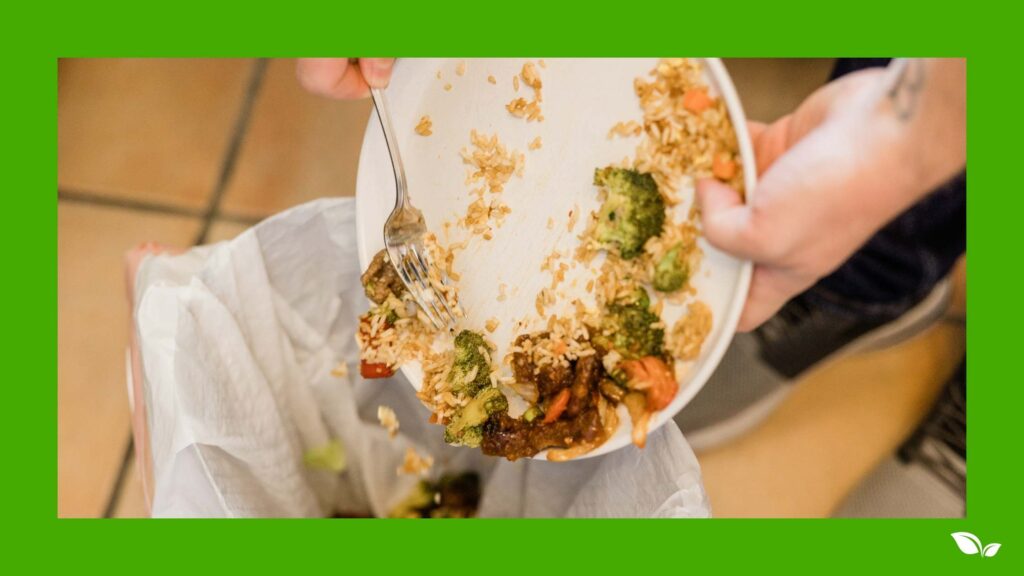
5. What is the Restaurant Waste Collection Process?
The restaurant waste collection is just 4 easy steps!
- Choose Your Bins – Select the sizes and types you need.
- Arrange Delivery – Bins delivered without extra rental charges.
- Fill Your Bins – Keep waste separated.
- Scheduled Collection – Regular pick-ups based on your venue’s needs.
At Waste Basics, we keep recycling simple, transparent, and affordable. Get your free quote today and see how much you could save.
![sushi[1]](https://wastebasics.co.uk/wp-content/uploads/2023/11/sushi1-2240x1120.jpg)





